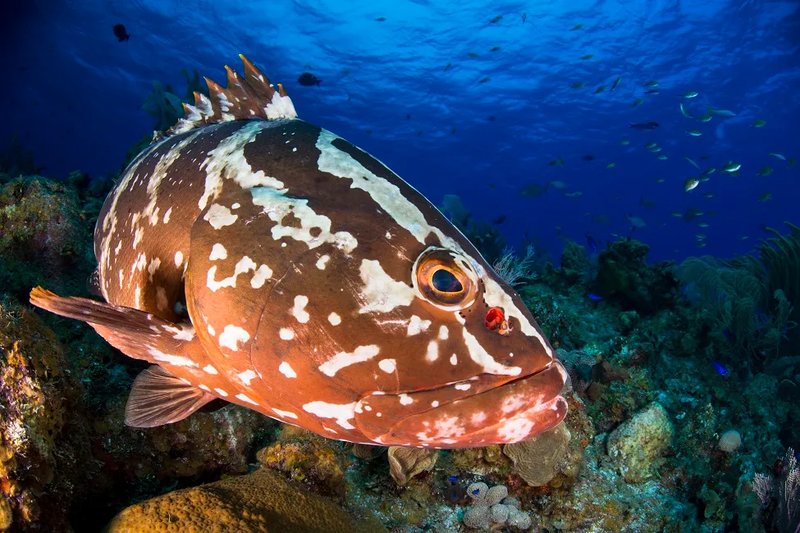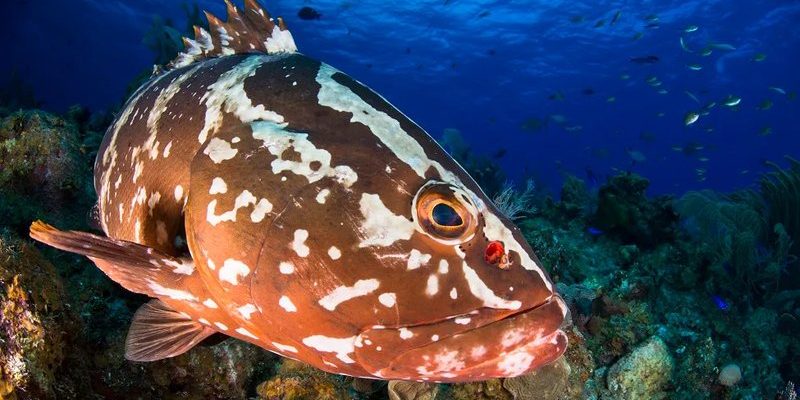
Grouper species, like the Nassau grouper and the Goliath grouper, come in many shapes, sizes, and colors. They inhabit warm tropical waters and are known for their robust presence in the food chain. Just like how every cog in a machine is vital for it to run smoothly, groupers are essential for the overall health of their underwater environment. Let’s dive deeper into understanding their roles, behaviors, and why they matter so much to our oceans.
What Are Groupers?
Groupers are a family of fish known scientifically as Epinephelidae. They can be found in various temperate and tropical oceans around the globe. These fish typically have a hefty build and can grow quite large, with some species reaching lengths of up to eight feet! They often have varied colors, including greens, browns, and even vibrant yellows.
One characteristic that stands out about groupers is their ambush predation technique. They like to hide in crevices and coral formations, waiting patiently for unsuspecting prey to swim by. This hunting style makes them effective predators and helps maintain the balance of fish populations in their habitats.
Their fascinating life cycle also deserves mention. Groupers are known to exhibit sequential hermaphroditism, meaning they can change their sex depending on environmental and social factors. Typically, smaller groupers start as females and can become males as they grow larger and dominate their territory. This adaptability is vital for their survival and reproductive success.
The Grouper’s Diet: Who Do They Eat?
Groupers are carnivorous, meaning they primarily eat meat. Their diet mainly consists of smaller fish, crustaceans, and other marine creatures. When hunting, they can suck in prey with an impressive vacuum-like motion, using their powerful jaws. Here’s a quick look at their common meals:
- Smaller fish like snappers and wrasses
- Crabs and lobsters
- Octopuses and squid
Their role as predators is significant. By keeping populations of these species in check, groupers help prevent overpopulation, which can lead to unhealthy ecosystems. For example, if too many smaller fish were to thrive without their natural predators, it could lead to the overgrazing of coral reefs, causing a decline in marine biodiversity.
You might be wondering how this impacts us. The health of our oceans directly affects our climate, fisheries, and even our economy. Healthy grouper populations contribute to thriving reefs, which are crucial for tourism and coastal protection.
Groupers and Coral Reef Health
Coral reefs are among the most diverse ecosystems on the planet, but they are delicate and can easily be disrupted. Groupers play a pivotal role in maintaining the health of these underwater cities. As predators, they help manage the populations of herbivorous fish that graze on algae, which can smother corals if left unchecked.
Without groupers, you could imagine a scenario where algae overgrow, blocking sunlight and stunting coral growth. This process not only harms coral but also impacts countless marine species that rely on coral reefs for shelter and food. Groupers, by keeping herbivore populations balanced, help ensure that corals receive the light and space they need to thrive.
In simple terms, think of groupers as the ecosystem’s caretakers, helping to maintain a balance that supports a multitude of life forms. Their presence in a reef is a sign of a healthy environment. In areas where grouper populations have declined, scientists often notice a decline in overall reef health too.
The Importance of Protecting Groupers
Unfortunately, groupers are facing significant threats, notably from overfishing and habitat loss. Many grouper species are considered vulnerable or endangered, primarily due to their slow reproductive rates and high demand in the seafood market. When groupers are overfished, it disrupts the delicate balance of their ecosystems.
This decline isn’t just a loss for marine life; it can also affect human communities dependent on healthy oceans. Many coastal communities rely on fisheries for their livelihoods, and the decline of grouper populations can mean less income and food security for those families.
Conservation efforts are critical. By creating marine protected areas, enforcing fishing regulations, and promoting sustainable fishing practices, we can help ensure that grouper populations rebound. It’s not just about saving a fish; it’s about protecting an entire ecosystem that supports countless species, including us.
Groupers in the Food Chain
Groupers are a key species in the marine food web. They sit confidently in the middle of the chain, meaning they prey on smaller fish while also serving as food for larger predators, like sharks and barracudas. This interconnectedness means that if groupers decline, it can create a ripple effect, disrupting the entire marine food web.
When groupers are plentiful, they help support a balanced ecosystem. They provide a reliable food source for larger fish, which keeps those populations healthy and vibrant. If groupers were removed from the equation, there would likely be an increase in smaller fish populations, which might eventually lead to overgrazing of algae and, ultimately, harm to coral reefs.
Moreover, when groupers are harvested sustainably, they contribute to local fishing industries. This reinforces the idea that protecting grouper populations isn’t just good for the ocean; it’s good for humans too. Healthy fishing practices can ensure that communities continue benefiting from marine resources for generations.
How Can You Help Groupers?
You might be wondering how you can contribute to the protection of groupers and their ocean homes. Here are a few simple ways to get involved:
- Choose Sustainable Seafood: When buying seafood, look for labels that indicate sustainable practices. This helps ensure that the fish you eat are caught without depleting populations.
- Support Marine Conservation Organizations: Donating or volunteering with organizations that work to protect marine environments can make a difference.
- Spread Awareness: Share information about the importance of groupers with your friends and family. The more people know, the more we can work together to protect them.
Every little action counts. By making informed choices and advocating for marine conservation, you can help preserve the delicate balance of our oceans.
In conclusion, groupers are more than just fish swimming around coral reefs; they are vital contributors to the health and stability of marine ecosystems. Their role as predators, their impact on coral health, and their place in the food chain underscore why they matter so much. Protecting groupers means ensuring that our oceans remain vibrant, balanced, and full of life. So, the next time you think about the ocean, remember the grouper and the critical role it plays in keeping our underwater world thriving.

